SIGN UP FOR NEWSLETTER
Be the First to Know. Sign up to newsletter today
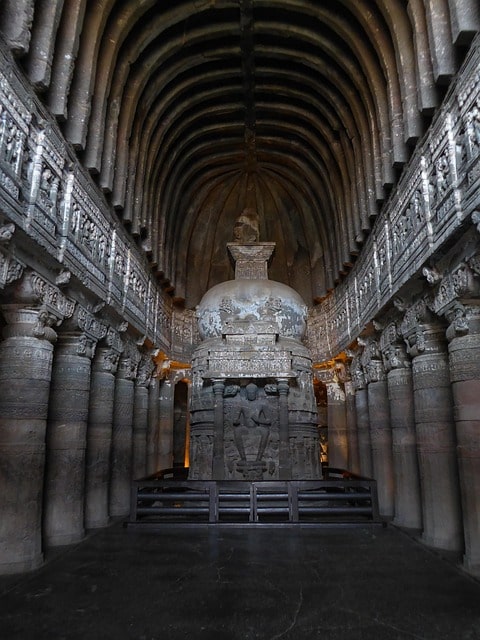
Guest Blogger
357 views
add comment
The Ajanta & Ellora caves are rock cut caves and date from 2nd Century BCE (Before Common Era) to 480 CE (Common Era). The Ajanta caves are predominantly Buddhist caves or Buddhist Temples with murals & sculptures. On the other hand, the Ellora caves have Buddhist, Hindu & Jain paintings and sculptures. The magnificent & jaw dropping art, architecture & design is a gift to humankind.
Ajanta & Ellora Caves are UNESCO World Heritage sites
Location : They are in the Sahyadri hills near Aurangabad, Maharashtra, India. Aurangabad has been recently renamed as Chhatrapati Sambhajinagar by the Maharashtra Government. Aurangabad is approximately 300 kms from Mumbai. There are direct flights to Aurangabad from several metros in India.
Best Time to Visit: November to March
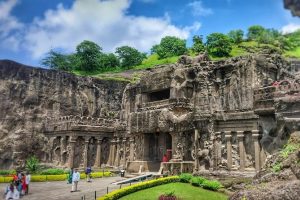
Kailasa Temple
Day 1: Arrival in Aurangabad
On your arrival in Aurangabad, you can check into one of the airport hotels that are close to the airport. The next day, you can hire private transport & travel to the Ajanta Caves. It is about 100 kms from Aurangabad and would take you approximately 2 hours to reach. In addition, you can stop at the Bhadra Maruti Temple (Sleeping Hanuman Temple) on the way. The roads are good except for brief patches of potholed roads. Once you reach the foothill of the caves you should be able to take a State transport bus to the entrance. Further, a 10 minute climb would bring you to the magnificent Ajanta caves.
It is a busy entrance. For example, there are several tourist shops in case you wish to make some small purchases of faux jewellery, bags or books.
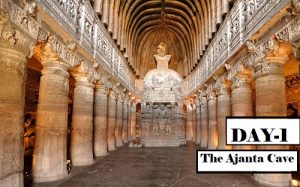
The Ajanta Caves are in a U shape (horse shoe structure) on the river Waghur in the Deccan Plateau. They are a series of 30 rock-cut Buddhist monuments carved between the 2nd century BCE and 6th century CE. As a matter of fact, they were hidden for centuries by a thick jungle and rediscovered in 1819 by a British officer, John Smith. He was on a tiger expedition in the hills.
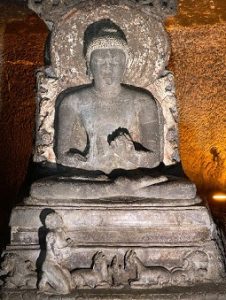
Gautama Buddha
Cave 1 is the most magnificent cave to visit. It is adorned with iconic art works & with paintings on 3 sides and on the ceiling too. Innumerable scenes from the Buddha’s life are painted here. The serene expression of the Bodhisattva Padmapani, painted in mineral colours has lasted over two thousand years. This image of Padmapani is the most prominent image in all of the Ajanta & Ellora Caves. Vajrapani with the mythical Vajra or (weapon) denotes strength & courage while Padmapani denotes compassion. Vajrapani is said to protect the Buddha & his teachings. They represent the ideals of compassion, kindness, power & strength in Buddhist mythology.
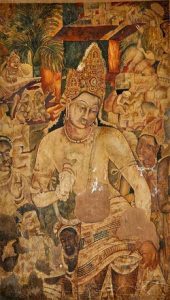
Padmapani Mural
The play of natural light filtering in through the stone windows give life to the figures on the walls. One cave leads to another, each more exquisite than the other and each demanding your attention and reverence. Stories from Arya Surya’s Jataka Mala (Sanskrit poetry dating to the 4th century on Buddha’s past lives) are beautifully painted. The paintings, the colours & the attention to detail of both humans & animals & the costumes are spectacular.
Some of the caves have stunning sculptures. The sculpture of the magnificent Buddha in a teaching posture or meditative posture is truly remarkable. For instance, each cave tells a story from Buddha’s life — through murals, frescoes & sculptures. In addition, there are prayer halls or Chaityas & Viharas or dwelling places.
The last cave has the sleeping Buddha.
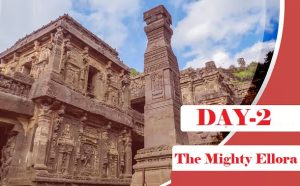
The next morning, you can take a trip to Ellora, which is just 30 km from Aurangabad. Further, you can stop at the Shri Grishneshwar Jyotirlinga Temple which is a famous Shiva Temple.
As compared to the serene spirituality of Ajanta, Ellora is a celebration of India’s multi-religious harmony. For instance, these 34 caves, built between the 6th and 10th centuries, include Buddhist, Hindu and Jain monuments.
The Kailasa Temple (Cave 16) is an entire temple complex carved from a single rock. It is a monolithic structure. Artisans, over a millennium ago, removed over 200,000 tons of rock to carve this marvel. As the name suggests, this is a Shiva temple. Further, it has the sculptures of the 10 avatars of Lord Vishnu and the story of Ramayana sculpted on the wall.
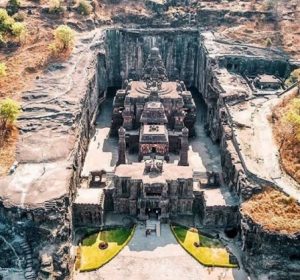
Kailasa Temple, Ellora
Ellora’s diversity is striking. In one afternoon, you can walk through Buddhist Temples, intricate Hindu sculptures of Shiva and Jain temples.
Ajanta and Ellora Caves are more than just historic sites — they are exceptional experiences. Further, they were built as Buddhist prayer halls for the monks and resting place for travellers. They remind us that even centuries ago, humans sought beauty, meaning and transcendence. In other words, the architecture & art combined to elevate human existence.
Paithani sarees are famous in Aurangabad. Do not miss them. They are manufactured in Paithan in the Aurangabad district. As a matter of fact, the designs in the Paithani sarees are copied from cave carvings & designs. n addition, there are Himroo sarees that are also manufactured in Aurangabad. For instance, the designs are so unique in these fabrics and they stand out for their beauty & class. Further, you can also purchase a Paithani shawl or dress material.
As a matter of fact, there are good outlets to purchase these fabrics directly from the manufacturers on the way to Ellora.
Be the First to Know. Sign up to newsletter today